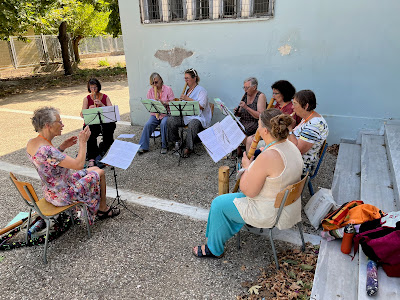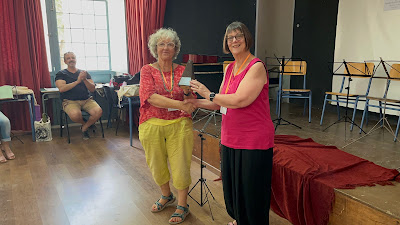by Jeroen Zijlstra
It is common knowledge that bamboo flutes are also played enthusiastically outside the Netherlands. The NPG has several sister associations in other countries, such as the Ελληνική Συντεχνία Φλογέρας από Καλάμι, in our letters Elliniki Syntechnia Flogeras apo Kalami, or the Greek Guild of Reed Flutes. The Greek Guild is not as large as ours. It has a few dozen members, some very good musicians and not to forget Natasa and Fivi, two tireless organizers who strive to organize a summer course once every two years. The teachers and participants do not only come from Greece, our own Corry de Klepper has been a regular guest at the Greek bamboo flute activities for years. Because she had other activities this summer - you can read about them elsewhere in the magazine - I had the honor of giving a series of lessons at the summer course in Olympia, in the western Peloponnese, at the end of June and the beginning of July.
I could have written a long article just about the journey. Let’s summarize that part by telling that I do not fly on principle and I arrived by train, bus, boat and on foot, a journey that would ultimately take five days. When I got off the bus, Natasa and Fivi were waiting for me to welcome me warmly and show me the way to the hotel. Fortunately my room had air conditioning, because it was hot, with afternoon temperatures around 35 degrees.
The course started the next day. There were over forty participants, most of them from Greece, but also Denmark, England, the United States, Switzerland and Italy were represented. For the Danes, for example, who no longer have their own journeymen and therefore cannot organize courses themselves, the foreign summer courses are the only way to meet other bamboo players and gain inspiration.
The lessons took place in the local high school (gymnasium in Greek), about eight hundred meters away from the hotel. A short walk in the bright sun through a beautiful landscape ... but the Greeks thought very differently about that. Last summer, several tourists died from heat and dehydration during an innocent walk. It was therefore not surprising that the Greeks warned us naive Northern Europeans not to go out on the street unprepared, and it was also not surprising that I walked around for days in a sun hat for the first time in my life. When we arrived at the gymnasium, the Great Ensemble took place under the direction of Rose Atkinson and Spyros Marinis, two completely different musicians. In this way, we were treated to both pentatonics and two highlights of Greek music, namely the Olympic Hymn and of course Zorba, in an eight-part arrangement.
The group then split up into different playing groups. In the group that I led, I offered the highlights from the youth weekends and playing days of the past years, music that is suitable for absolute beginners and absolute virtuosos, of which there were representatives from both categories in my group, who all threw themselves with great energy into the challenges in the arrangements that were unknown to them. I in turn joined the course in Greek traditional music given by Vago Anagnostopoulos, mostly in exotic time signatures such as 7⁄8. Difficult? Yes, if you try to perform it with only non-Greeks, who try to understand what is written by counting. The message: don't count, don't try to understand it with your head, but listen to the melody that smoothly weaves through the irregular beat. This music has to get into your body, as became even more apparent when the Greeks danced to it in the evening, with many non-Greeks also showing their true colours.
And then an unexpected party pooper appeared: corona. The first victim was our own Renilde Duif, one of the three Dutch people on the course (the third was Willemien Rouwenhorst). Renilde was not feeling well on the morning of the second day and had asked me to conduct the choir in her place, in case she did not recover. After a test she turned out to have corona and she had to go into isolation immediately. A few face masks appeared on the course. Despite this, it was inevitable that several participants were struck down by the dreaded disease and had to withdraw from the course. Thus, several playing groups lost one or more players during the course. Fortunately, enough people remained to be able to put on a beautiful public performance on the closing evening, in the town hall of Olympia. To say that the entire village had turned out is an exaggeration, but the people who had come were wildly enthusiastic. Fortunately, Renilde had recovered enough in the meantime to be able to participate in the closing presentations.
Something else special happened during the course. It is tradition that during the International Course, organized every five years in a different country for many years, the Holy Metronome that belonged to Margaret James is handed over to a representative of the organizing country of the next course. In Biezenmortel 2022 (a year later due to corona) it was not yet clear where the 2026 course would take place and therefore the Metronome was given to Rose on behalf of England, the cradle of bamboo pipes. It is now clear that the next International Course will take place in France, organized by the joint guilds of Switzerland, Italy and France. In Olympia the metronome was ceremoniously handed over by Rose to Maria Kempf from Switzerland. Because Maria and I traveled together for a while on the way back - she traveled on to Bologna, where the Italian bamboo pipe summer course would take place - I was in the company of the Holy Metronome for a day, which made sure (I am convinced of this) that we did not suffer any delays on the Greek buses and boats and Italian trains.
Το παραπάνω κείμενο περιλαμβάνεται στο φθινοπωρινό περιοδικό της Ολλανδικής Συντεχνίας . Ήταν μεγάλη μας χαρά που είχαμε τον Γερούν κοντά μας στην Ολυμπία και που ανέλαβε την χορωδία πέρα από το μάθημα του. Ευχαριστηθήκαμε όλοι πολύ και ελπίζουμε και σε μελλοντικές συνεργασίες!


.jpeg)




Δεν υπάρχουν σχόλια:
Δημοσίευση σχολίου